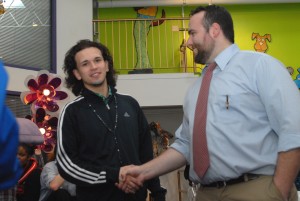One of the key goals of JRC’s treatment program is that the JRC students’ behavioral progress will generalize over time and across settings.

JRC has conducted several former student follow-up studies in order to assess to what extent former JRC students continue to succeed.
Common findings include:
- former students are in less restrictive educational/treatment settings;
- they enjoy a wide range of positive social experiences;
- they take less (and oftentimes no) antipsychotic medication;
- they enjoy improved social relationships, including long-term relationships and marriage;
- they enjoy a reduced need for mental health treatment;
- some pursue further education (including college-level education);
- many are in either supported or competitive (e.g., military, police force) employment settings; and
- they typically rate themselves (or are rated by their guardian) as significantly better adjusted post-JRC enrollment than was the case prior to their admission to JRC.
Given the dangerous, disruptive, and sometimes life-threatening behavior problems that bring a student to JRC, such follow-up findings are remarkable. Our 2014 study can be downloaded at this link. (pdf)


